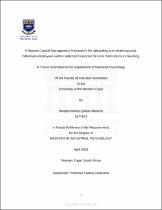| dc.description.abstract | Millennials and Gen Z form quite a substantial generational demographics in both the developed as well as emerging economies. Together, these cohorts of millennials and Gen Z, are transforming the workplace norms and the use of technology therein in significant ways. Worth noting is that financial institutions are not exempt. However, for those financial institutions that are already operating in a digital environment, millennials and Gen Z are bringing about very pragmatic modification in the modus operandi of those institutions. In the light of this trend, there is a need for these institutions to come up with practicable strategies for attracting and retaining post-millennial employees. The aim of this study was to develop a Human Capital Management framework for attracting and retaining post-millennials (Gen Z) employees within selected financial service institutions in Gauteng province, South Africa. The study followed a descriptive qualitative research method where eleven semi-structured interviews were conducted with sampled millennials who are human resource professionals working within selected financial service institutions in Gauteng. Through these semi-structured interviews, the insights of the sampled study respondents were solicited. A review of relevant literature was carried out. The study’s findings indicated that the financial services sector can greatly benefit from employing post-millennials. These are young, tech-savvy, and environmentally conscious, require instant gratification, fearless, need life coaching, and are not worried about titles and authority. Post-millennials can be attracted and retained through flexible work environments and benefits such as career mobility programmes, job enrichment and the institution of appropriate management styles, collaboration with academic institutions, designing appealing job titles, restructuring benefits, and remote working and flexible hours. The study recommended that organisations need to prepare for the entry of post-millennial employees by adopting technology, offering flexible environments and benefits, establishing integrated working environments and improving their brand reputation. | en_US |

